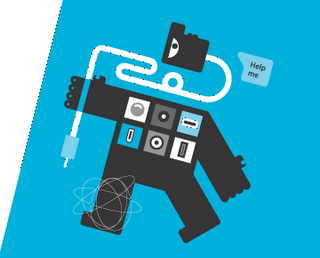
The glass is half empty
I don't have hard figures (would love to see them, they are not readily disclosed) but there has been consistent talk for some time about declining enrolments in IT courses in South Australia, Victoria, NSW and I presume the other states as well.
I find this astonishing, that serious study of such an important literacy for this century is on the decline.
This goes hand in hand with integration of ICT into the curriculum, which in general does not work very well because students end up being taught IT by non specialists. ie. they are not taught IT.
This is further compounded by generational factors - many students come to believe that many teachers don't have anything to teach them about IT. Unfortunately, some teachers seem to believe this too.
Students come away from the senior school course counselling process with the belief that universities would prefer they learn maths at school and wait until they get to uni before doing programming.
Some governments (India, China) have a policy of positively promoting science, maths and IT but in egalitarian Australia all subjects are regarded as equal and IT is hardly even regarded as a subject.
There is a current energetic discussion at the South Australian teachers IT list about the best way to refloat the sinking ship. This has taken the form of arguing about preferences for the best IT course, with options like:
- focus on important computer science principles (the fundamentals, not the fads)
- more emphasis on programming, which the new curriculum statement has allowed
- keep the current emphasis on data base, well established resources here
- more multimedia, students find this interesting
- web programming is motivational
- game making, tap into student motivation
It's an energetic and informed discussion and different teachers have made very good points about why their course preference is either better or necessary
One comment which I found the most interesting was:
> The core computing knowledge hasn't changed much over 26 years
From a computing science point of view I think this is not far from the truth.
I like
this article by David Wheeler
which, in a way, supports what was said:
Too many people confuse software innovations with other factors, such as the increasing speed of computer and network hardware
even though some significant innovations in the past 26 years are documented, such as distributed hypertext (1989) and design patterns (1991)
However, the factors of faster, more powerful computers (Moores Law), the growth of the internet / www and mobile communications have created an overall very different cultural and working environment for everyone, including teachers of IT. Some examples:
open source software development - as well as producing great software offers us a collaborative development model
wikipedia - another tremendous success story of online collaboration - just this week I discovered a student at my school who has authored 14 wikipedia articles, completely on his own initiative
blogs - used selectively in combination with RSS feed provide new opportunities for connecting and discussing common interests, educational or whatever
open courseware - the premier technology institution in the world, MIT offers all its courses on line for free,
http://ocw.mit.edu/index.html - how long will it be before this sort of thing is extended to secondary education? For example, why doesn't the ED support the delivery of a game making course to all those students who want to do it but don't have a teacher in their school to offer it?
better search - for the first time in history there is the potential for students to independently find all of the material that is delivered to them in school
I think the major blocks for everyone (students and teachers) to be able to teach the course they want or to learn the course they want are cultural and institutional hangovers from a previous mode of course delivery limited by the geographical tyranny of distance. That era is now coming to an end, the quicker the better from my perspective.
The glass is half full.
Afterthought:
Some people would probably say in response to the above that face-to-face teaching is still the best available model.
I'd reply that our current model is very much an industrial model. One teacher: twenty+ students in a classroom, on a site and that just doesn't work all that well for quite a few of the students
Specifically, in this blog I have been critical of the "glass half empty" mindset which IMO has characterised some of the current discussion amongst SA IT teachers. As enrolments in IT decline there is more struggle around the idea of the "best" IT course to retrieve the situation.
I definitely see that discussion as healthy - it's great that different teachers are being passionate about their preferred method of teaching IT and arguing their case.
But this discussion shouldn't be confined locally just to SA IT teachers when the technology already exists so that potentially all of these courses or parts of them could be delivered to students at a distance.
Of course the fact that the read/write web is censored by default in SA schools does not help things. Certainly teachers can plan and collaborate professionally around the world using blogs, wikis, podcasts and VOIP for voice and chat. This can be extended to students.
It is just the local accreditation mechanism and small pond mentality that is holding things back.
I remembered
Lessig's refrain which he applies to draconian copyright law. I think it also applies to our current industrial model of education. It is the dead hand of the past that is keeping kids tied down to one teacher, one classroom, set curriculum, set accreditation, the bell rings, go to next lesson etc.
- Creativity and innovation always builds on the past.
- The past always tries to control the creativity that builds upon it.
- Free societies enable the future by limiting this power of the past.
- Ours is less and less a free society.
Tags:











